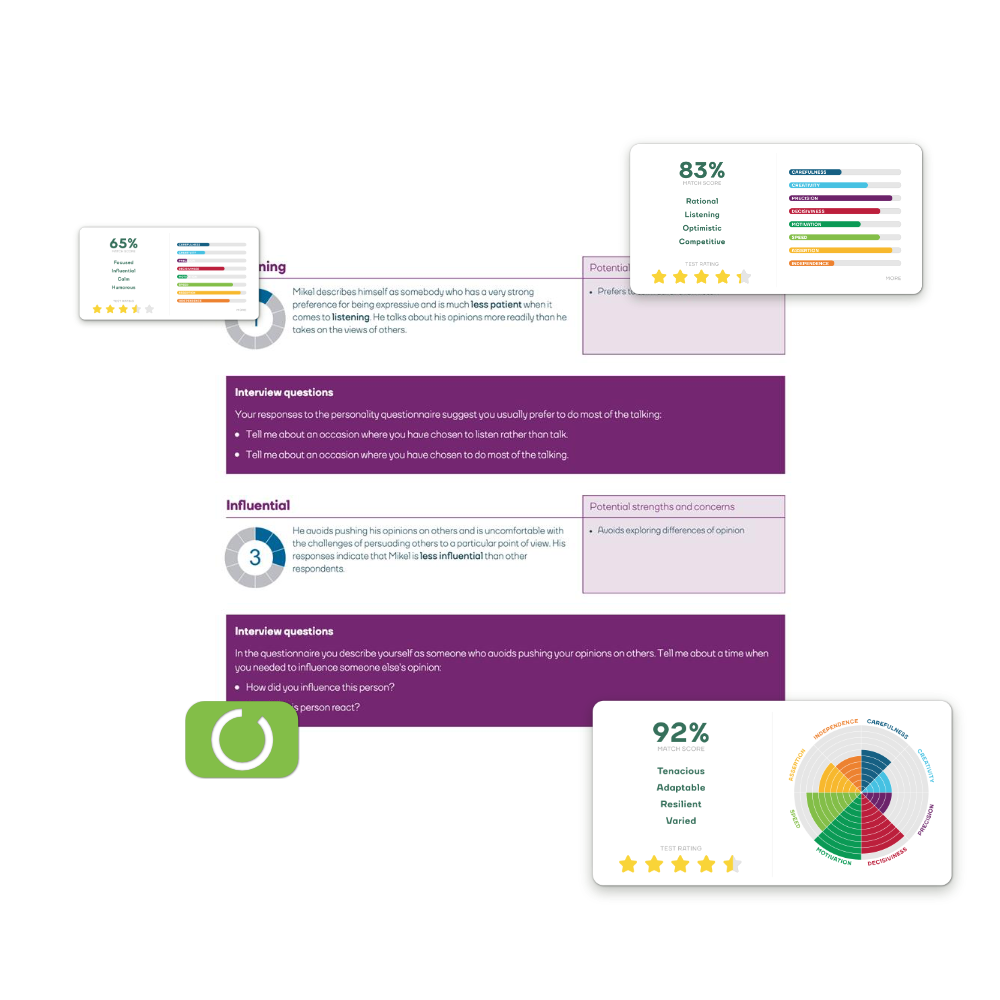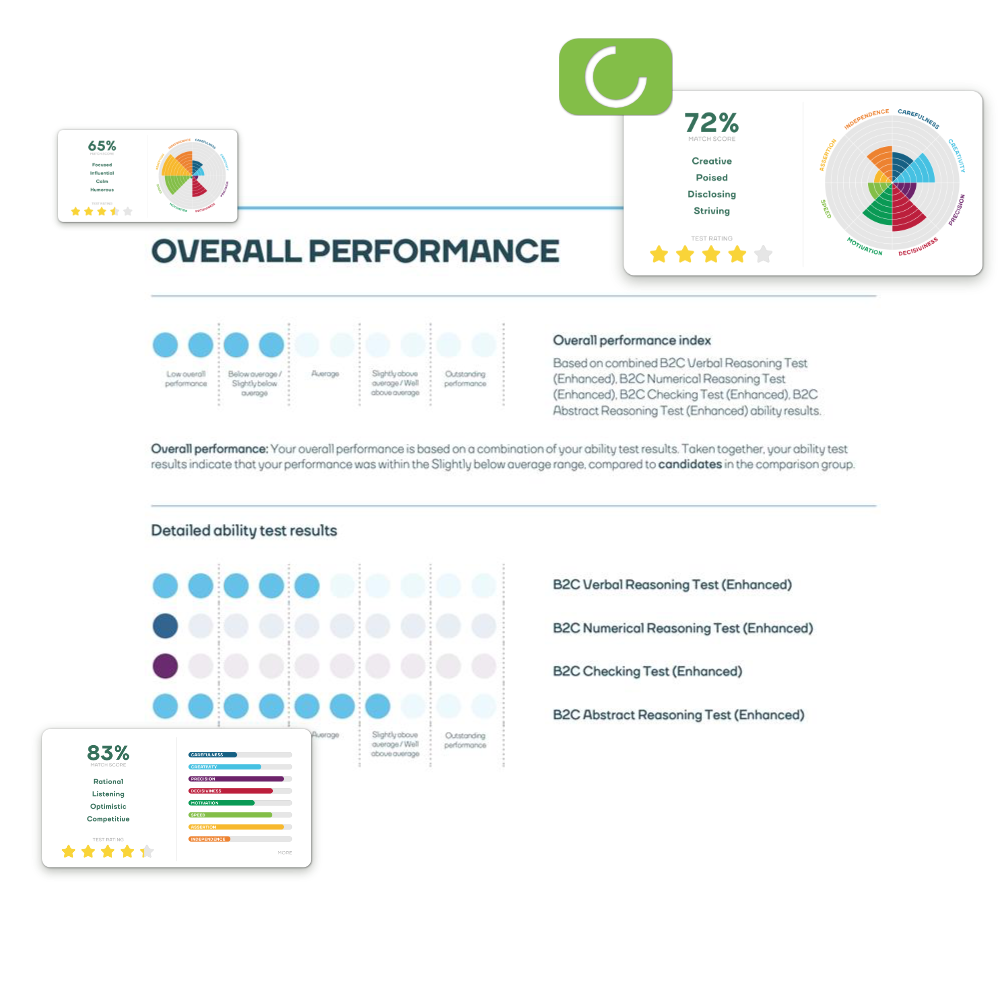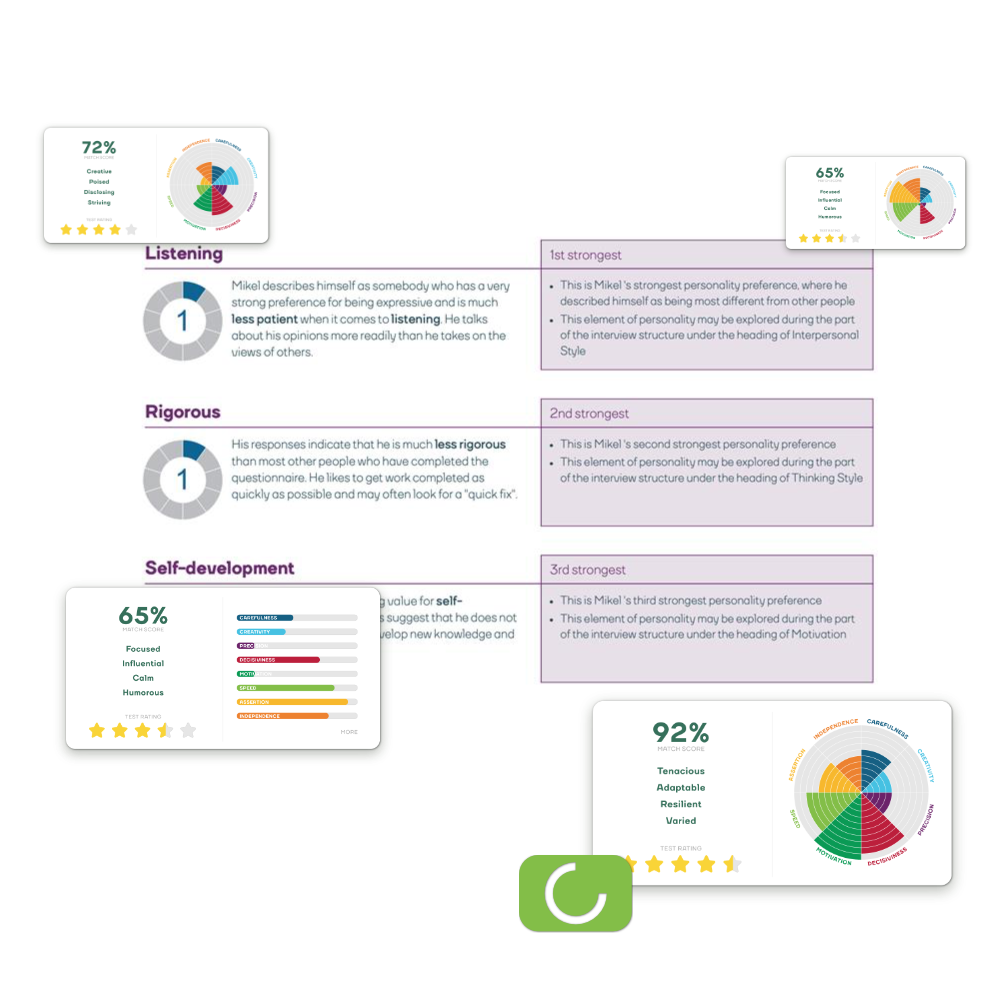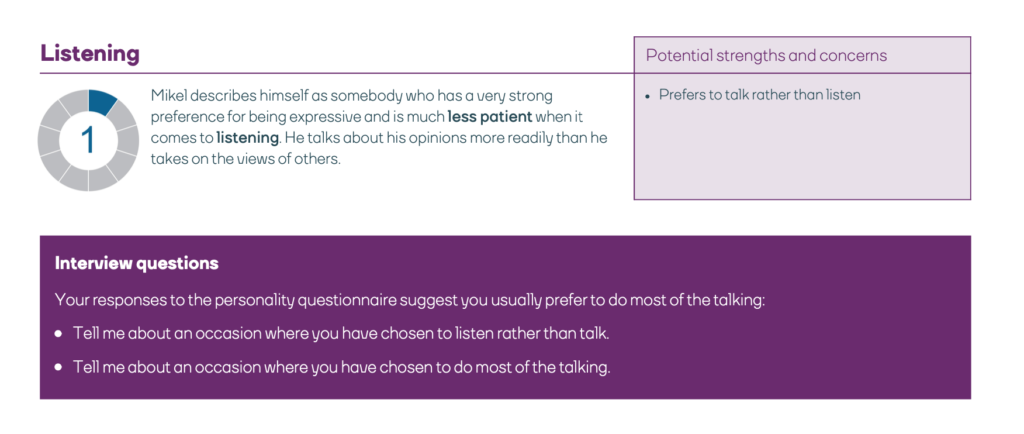Resources
How to interview someone
How to conduct an interview. The ultimate guide to interviewing candidates.
Home » Resource Library » How to interview someone
How to interview someone
Interviewing candidates can be an incredibly time-consuming part of the recruitment journey, if not the most time-consuming part. Getting it wrong can have significant consequences for both the hiring process and the overall success of your recruitment (and business).
Knowing specifically how to interview someone will go a long way in determining the quality of hire you get. It requires careful preparation, effective questioning techniques, and the ability to assess candidate behaviours and answers accurately.
Therefore, knowing how to interview someone properly will play a key role in the overall success of your recruitment efforts, ensuring that you select the best fit for the position and your organisation.
But just how do you interview someone? And how do you know what questions to ask and the behaviors to look out for? In this guide, we will provide you with essential tips and strategies to conduct successful interviews that help you make informed decisions and find the ideal candidate for your team.
Preparing for interview
The first stage of any interview is crucial in ensuring its success.
Before any interview the interviewer should thoroughly review all the candidate’s application materials, including their CV, cover letter, and any additional documents they may have submitted.
Familiarise yourself with their qualifications, experience, and achievements in order to have a solid understanding of their background.
Prepare a list of relevant questions that will help you assess their skills, knowledge, and suitability for the role.
The interview itself
During the interview, it’s essential to establish a positive rapport with the candidate to create an atmosphere conducive to open and honest communication. Start by introducing yourself and providing a brief overview of the interview process.
Some initial icebreaker questions can help put the candidate at ease. Ask a combination of behavioral and situational questions to assess their past experiences and problem-solving abilities.
Actively listen to their responses, take notes, and ask follow-up questions to gain a deeper understanding of their skills and qualifications. Ensure that the interview remains focused and on schedule, while also allowing the candidate enough time to ask questions and address any concerns they may have.
Final evaluation & decision
After the interview, take time to review your notes. Evaluate their responses, qualifications, and fit for the role based on the predetermined criteria. Consider both their technical competencies and their cultural fit within the organisation.
Collaborate with other interviewers or hiring team members to gather additional perspectives and insights.
Compare the candidates’ strengths and weaknesses, taking into account their potential for growth and development.
Finally, use the information you have gathered to make a better-informed decision, and then present your recommendation to the appropriate decision-makers. Communicate the decision to the candidates promptly and professionally, providing feedback whenever possible to assist them in their future endeavors.
How to be a good interviewer
Being a good, effective interviewer requires more than just having a charismatic personality.
When interviewing, the best interviewers utilise a combination of their people skills, communication skills, and a good set of strategic interview questions that have been well researched and tailored to the candidate.
The best interviewers will do all of this while also making their candidates feel relaxed and at ease throughout.
The most successful interviewers all share some of the same behaviours. So what are they? And how can you be a good interviewer?
Behaviours demonstrated by successful interviewers
The best interviewers employ a strategic questioning approach, starting with broad, concrete, and open-ended questions early on.
By asking broad questions, interviewers gain insights into the candidate’s overall background and approach to work. As the interview progresses, successful interviewers then shift towards focusing on specific examples of behaviour to delve deeper into the candidate’s abilities and past performance.
Being diligent in your approach and probing until you are satisfied that the candidate has revealed a true representation of how they have behaved in the past.
This probing allows interviewers to delve deeper into the candidate’s thought processes, actions, and outcomes, ensuring a more accurate assessment of their past performance
Successful interviewers employ a balance of soft but direct questions that reasonably deserve answers. By using a softer tone and approach, interviewers put candidates at ease, encouraging them to share openly and honestly.
Questions like this are designed to gather specific information and insights that help assess the candidate’s suitability for the role. Successful interviewers strike a careful balance, maintaining professionalism while fostering a conversational atmosphere that allows candidates to provide meaningful responses.
Look for evidence of patterns of behaviour across different circumstances and in response to different questions
Many of the best interviewers will take comprehensive notes throughout the interview so they don’t miss or forget key information
Stop candidates from meandering into speculations about what they ”would do” or from talking generally about ”we” rather than ‘I’
The most successful interviewers explore the following 5 points and leave no stone unturned; Why? How? Likes & dislikes, Rationales for choices, Self-evaluations
Successful interviewers withhold judgment throughout the interview process. They understand that first impressions can be deceiving and that a candidate’s true potential may not be immediately apparent. Instead of making snap judgments, successful interviewers remain open-minded and actively listen.
Successful interviewers encourage openness by recognising and appreciating a candidate’s accomplishments to create a supportive atmosphere during the interview.
The best interviewers feel comfortable with silences and understand the importance of giving candidates enough time to think. They recognise that the pressure to provide immediate responses may hinder the ability of a candidate to fully articulate their thoughts.
By embracing silence, interviewers create a space where candidates can gather their thoughts, reflect, and provide more thoughtful and genuine responses.
Interviewers should strive to make the candidate feel at ease and build rapport throughout the interview.
Establishing a trusting environment encourages candidates to be open and honest in their responses.
By demonstrating empathy and understanding, successful interviewers establish a connection with the candidate, making them more comfortable to share their thoughts and insights openly.
The most successful interviewers use non-verbal cues to communicate encouragement and interest to candidates.
Body language can have a significant impact on the candidate throughout the interview.
Cues such as nodding in agreement, smiling genuinely, and maintaining consistent eye contact create a positive and encouraging atmosphere.
In order to get the most from your interviews, as well as the above points, it is equally important that your candidates feel relaxed. Nervous candidates don’t often show themselves in the best light, while candidates who are in a highly motivated state have a greater tendency to impression manage.
Therefore it is important that the candidate is in a relaxed, natural state of mind before beginning the main part of any interview.
How to ensure your candidates are relaxed
1.
Unconscious behaviours
Small talk can be used to help the candidate relax, although if overdone can appear false. Many candidates are eager to get on with the interview so ask them a friendly question early on to get them talking openly and settle their nerves. E.g. you could find a positive thing on their CV and ask them to tell you about it.
We all subconsciously use a complex system of body language as well as encouragers and other non-verbal cues such as grunts of approval or agreement or by interposing ‘uh-huhs’ or ‘ers’ in conversation, raised eyebrows, smiles and appropriate levels of eye contact.
These behaviours have a powerful but largely subconscious effect upon the progress of a conversation and it is important to give them some thought prior to an interview. Non-verbal behaviour has a particularly strong influence when it comes to communicating the level of attention you may be giving to the other person. Since you must communicate the importance of the interview to the candidate it is essential that you at least appear to be attending fully.
Your aim here should be to encourage the candidate to smile, relax and get the feeling that you understand them and that they can trust you.
2.
Matching
Match the candidate’s posture, facial expressions and gesture.
Matching is an unconscious form of communication that deepens rapport.
Matching is doing the same i.e. sitting opposite the candidate, you match them leaning to their right by leaning to your right.
3.
Mirroring
Mirroring is where you do the opposite i.e. as they move their right arm you move your left arm as a mirror image.
Be subtle in the way you do this by matching or mirroring larger movements, like leaning forward or backwards rather than more precise movements.
Match or mirror when it is your turn to speak, rather than when the other person is gesturing.
4.
Pacing
Pace the candidate’s speed and style of delivery. When pacing the voice listen for rhythm, volume, speed tone and pitch. Fast talkers are quickly frustrated by slow talkers and slow talkers quickly find fast talkers difficult to understand.
There is a good technique that is worth practising, which can help you build rapport, and can easily be remembered through the acronym SOLAR:
Sit Square-on to the candidate, facing them. Adopt an Open posture with your shoulders back, your arms unfolded and your legs uncrossed. Make sure there are no physical barriers between you. (This includes a desk).
Lean forward slightly. Demonstrate that you are attending fully by nodding appropriately, using non-verbal encouragers and appropriate facial expressions and by avoiding distracting habits such as scratching your nose or looking at your watch.
Relax. If you are tense, then the atmosphere will become tense very swiftly and nothing is more likely to inhibit the development of rapport with the candidate.
Building rapport with the candidate is a skill which can be developed with practice and stems from a combination of verbal and non-verbal behaviour.
Posing powerful questions
Once you have your candidate relaxed the main part of the interview is spent exploring their suitability for the role. This involves asking past-tense, concrete questions to identify areas of strength and concern in terms of the role.
Past-tense, concrete questions are the key to a successful interview, but very few interviewers can think up sufficient good questions spontaneously when put on the spot. Therefore, even the best interviewers need to prepare in advance. When preparing make sure you use questions with the following qualities:
Ask open questions: The 'W's'
- What? Where? When? Why?
- Also: How? and ‘Tell me about…’
- Questions that require more than a yes/no answer
- For example… ‘Which project/aspect of your work have you been most pleased with?’ or ‘What has been your best achievement this year?’
Past tense/historical
Questions that explore the candidate’s past behaviour, not what they might hypothetically do in a scenario in the future. Examples of open concrete historical questions are:
- ‘What was the most demanding call you took from a customer?’
- ‘Give me an example of a time when you met a tough challenge at work?’
As an interviewer you can practise asking open questions until you feel that you can deploy them comfortably in an interview setting, without having to root around for the appropriate wording.
Also practice getting comfortable with silence; if you can sit in silence for even 30 seconds it could be a great asset in persuading a reticent candidate to be more forthcoming!
Unsure what questions to ask?
Our Interviewer Report provides interviewers with strategic interview questions that have been tailored to each candidate depending on how they responded to our personality questionnaire.
Report includes:
- Strongest preferences
- Self-presentation
- Cognitive ability test results
- Detailed interview guidance
- Interview questions
Good interviewer skills
Interviewing candidates is a demanding skill that requires constant development and refinement.
In order to get the most from your interviews with candidates it’s often better to utilise the power of technology rather than just relying on gut instinct alone.
But just what skills make a good interviewer?
Take time to ensure you’re familiar with the candidates application and know the areas of the structure where you need to focus your attention.
It’s virtually impossible to remember everything each candidate tells you during interview – so take notes as you go. The candidate will expect you to…
Numerous surveys have shown that around 50% of candidates generally don’t like interviews.
If you take the time to make them feel at ease and relaxed throughout, you will be far more likely to gain a better understanding of them during the interview stage, and make a better decision when it comes to the eventual hire.
One of the single most powerful interviewing techniques is to repeat anything the candidate tells you back to them and demonstrate empathy for any emotions they display or describe.
Be curious and try to clarify your understanding at al times throughout the interview. Do not illustrate your assumptions to the candidate by asking leading questions.
Asking open questions will go a long way to getting the candidate to do the right proportion of talking during the interview (around 70%).
During the entire interview process you should look to represent your business as well as you possibly can. The way you handle your interviews will play a critical role in attracting the best candidates in future.
Common interviewer mistakes
Occasionally, errors and interviewer bias can occur during the interview, while others tend to affect the assessments and ratings we make after the interview.
Errors that can affect assessor/interviewer performance include:
The Halo and Horns effects refer to situations in which interviewers assign similar ratings to different aspects of a candidate’s performance, even when those dimensions are clearly separate.
It’s like placing a halo or horns over the candidate’s head, and saying they are exceptional (or terrible) in all areas. This prevents a comprehensive evaluation of a candidate’s strengths and weaknesses.
Reasons for the Halo or Horns effects include:
- Failure to consider all assessment criteria, leading to a narrow focus on only a few dimensions.
- Confirmatory biases, where interviewers emphasize similarities rather than differences between aspects of the candidate’s performance.
- Disregarding inconsistent or contradictory information that may challenge the overall evaluation.
- Lack of knowledge or acceptance of the distinct differences between the various assessment criteria.
- Comparing the candidate to someone the interviewer knows well and assuming they are similar in all respects.
Primacy (or first impressions) occurs when the interviewer assigns more significance to the initial impressions they formed of the candidate. After making a hasty judgment about the candidate’s suitability early in the interview, the interviewer subsequently pays less attention for the remainder of the meeting.
Recency is also a result of diminished concentration. In this case, the interviewer only remembers events that took place towards the end of the interview. In both primacy and recency cases, the middle of the interview is when interviewers are most prone to losing focus.
At the conclusion of the interview, the interviewer assesses the candidate’s performance. However, this evaluation process is susceptible to a variety of errors. These errors reflect the subjective use of the rating system by the interviewer, rather than providing an accurate reflection of the candidate’s performance.
It is crucial for interviewers to utilize rating scales consistently to ensure meaningful comparisons between candidates interviewed by different interviewers.
Leniency is the tendency to give high ratings and avoid giving low ratings. Interviewers exhibit leniency for various reasons, including:
- Desire to be liked and reluctance to be critical.
- Unwillingness to justify low ratings and negative comments.
- Concern that other interviewers are also lenient.
- Low standards for evaluation.
- Poor questioning or listening skills.
These factors contribute to leniency bias, which can compromise the accuracy and fairness of candidate assessments.
To address this issue, interviewers should aim for objectivity, provide constructive feedback when necessary, be mindful of biases, establish clear evaluation standards, and improve questioning and listening abilities.
Central tendency occurs when interviewers consistently assign middle ratings (usually 3 or 4 out of 5, or the amber). The reasons for central tendency include:
- Unconscious tendency to rely heavily on the middle rating.
- Reluctance to take a more decisive stance or express strong opinions.
- Inadequate observation or attention to detail, resulting in less differentiation between ratings.
- Unwillingness to provide justifications for assigning high or low ratings.
These factors contribute to central tendency bias, which can limit the usefulness and accuracy of candidate evaluations.
To address central tendency, interviewers should strive to provide a wider range of ratings, consciously evaluate candidates based on their performance, carefully observe and differentiate between candidates, and be willing to provide clear justifications for the ratings assigned.
Ensure that you assess the candidate’s performance based on the selection criteria outlined in the assessment form, rather than comparing them to other candidates you have interviewed.
It is important to avoid the trap of relative evaluation, where a mediocre candidate may be mistakenly perceived as good or excellent simply because they were preceded or followed by poor candidates.
By focusing on the established criteria and objectively evaluating each candidate’s performance against those standards, you can make more accurate and fair assessments.
Avoid placing excessive importance on observations made during the first few minutes of the interview at the expense of subsequent behaviour. It’s important to recognise that some candidates may take time to get warmed up and showcase their true abilities and qualities.
Rushing to judgments based solely on initial impressions can lead to overlooking valuable information that may emerge later in the interview.
Give candidates the opportunity to demonstrate their capabilities fully by considering their performance throughout the entire interview process, rather than relying solely on the first few minutes.
Severity is the tendency to only give low ratings. Severity sometimes occurs when interviewers:
- Have a desire to be seen as tough
- Do not understand that in this process high scores need to be given
- Possess attitudes about high ratings that are carried over from appraisals or peer reviews
Taking good behaviour for granted, but exaggerating the importance of certain negative behaviours and evaluating these more harshly than the positive ones.
Results from interviewers letting impressions from other sources over-influence evaluations (e.g. having expectations of a candidate because you know how they performed on a separate assessment or test).
What is interviewer bias?
Interviewers are only human and human beings are prone to a range of biases and errors that can affect the effectiveness of interviews.
Under normal circumstances these biases are in fact shortcuts that the brain uses to quickly make sense of the barrage of information we are presented with when dealing with other people.
When interviewing candidates it’s essential that we are conscious of these automatic (and biased) ways of dealing with information in order to prevent errors affecting outcomes.

Common interviewer biases
A structured approach to selection, using structured interviews, helps to enhance objectivity when hiring. However, it is important to recognise that human beings do not process information purely objectively. Our own beliefs, values, and biases inevitably influence our judgment of others’ behaviors.
Minimizing the impact of our biases begins with being aware of them. It is crucial to acknowledge that we all have our own biases deep down. Certain individuals may possess characteristics that we personally struggle with. These biases can stem from stereotypes or our own upbringing. Regardless of the cause, these biases can result in some candidates being treated less favorably due to the interviewer’s bias.
The following list provides examples of potential biases that can affect objectivity in assessments:
Interviewers who view a candidate more favourably because he or she reminds them of themselves, are subject to the similar to me bias. This can be in relation to their background, experiences, and so on.
Many people find particular regional accents off-putting. They may also associate stereotypical characteristics of a region to an individual with that accent.
An applicant who dresses in a particular way, whilst not unsuitable but which is not to your personal taste, may be viewed less favourably. Or someone with a hairstyle you do not like, or with bitten fingernails, may lead you to attribute characteristics to them that are not backed up by their actual behaviour.
It is unlawful to treat an individual less fairly because of their ethnic origin.
It is unlawful to treat an individual less fairly because of their gender.
By discriminating against someone because of their age, you could be losing someone with all the right qualities and a wealth of experience. And it’s illegal.
Minimising interviewer bias
To minimise the impact of assessment errors and personal biases on the assessments of candidates you should take account of the following points:
- Be aware of your own personal biases
- Begin observing the interview with a completely open mind
- Pay attention to the candidate
- Listen objectively to what the candidate says
- Suspend your judgement during the interview
- Use notes as a useful memory jogger to help maintain objectivity when you are evaluating the evidence and making a decision

Advanced interviewing techniques
Click one of the boxes below to find out more
What would a psychologist do?
Skilled interviewers use a number of techniques in their interviews to enhance the quality of the evidence they gather from their candidates.
Advanced interview techniques:
Active listening
Some interviewers get so worried about the next question that they forget to actually listen to the candidate. Good questions are of course pointless, unless you listen to the answer. If you have the confidence to listen to the candidate, you will find that the next question becomes a natural follow-on from the previous answer.
First, you must ensure you are showing active attention to the candidate; this involves verbal and non-verbal signals that you’re interested and responsive (rather than bored). Merely showing the signs of attention is obviously necessary but not sufficient; you must also learn to listen, ensuring that you have understood and absorbed everything the person has said.
This is easier than it sounds. In practice you may find that your mind wanders, or, if the person says something vague, you may be tempted to let it go rather than asking them to elaborate further. Asking for clarification and/or asking probing questions may seem to you as if you are putting the person under pressure, but in fact, people will expect this and your questions will themselves confirm your genuine interest in him/her.
Advanced interview techniques:
Summarising & reflecting back
Summarise what the candidate has told you and repeat it back to them. This will:
- Force you to listen attentively.
- Make it clear that you’ve been listening and have understood.
- Give them the chance to correct any things you have not correctly understood.
- Help you to remember what has been said by verbally summarising.
- Help punctuate the conversation.
Always summarise when you have finished an opening question and are about to move on.
Reflecting back is slightly different from summarising; you reflect back the emotion you perceived from the candidate’s response. Examples are:
- That sounds as if you were very pleased with the result
- That must have been very difficult for you
- Did that feel challenging?
The key benefit of reflecting back is to further increase the depth of rapport between interviewer and candidate. Reflecting helps the candidate feel understood. This will encourage them to be even more forthcoming and open with their subsequent responses to your questions.
Advanced interview techniques:
Controlling the interview
The most effective way to control an interview is to establish a pattern and rhythm early on. Most candidates are looking out for, and are receptive to, the informal rules of the interview. For instance if you press them for concrete answers to your first question they will know to be concrete in the future.
Unfortunately not all candidates are controlled that easily. Utilise some of the following tactics to help you control difficult interviewees.
Advanced interview techniques:
Interrupting
It is possible to interrupt without damaging rapport, but it takes skill.
The most effective interruptions are made just before the candidate has finished their sentence, but after they have finished their thought. If you wait until they finish the sentence they will be off on another thought. Interrupt with a positive comment such as ''I see. That’s very clear, but now I want to move on to...''
Advanced interview techniques:
Prompting
With quiet candidates who answer questions, but fail to elaborate sufficiently, simple prompts such as ‘Is there anything else?’ or ‘Tell me more about that’, can be highly effective.
Prompts can come from mentioning something that appears relevant on the candidate’s CV. Other prompts may involve giving the candidate some examples of the kinds of answer you are looking for.
Advanced interview techniques:
Non-verbal control
If you have established strong rapport with a candidate, non-verbally breaking this will interrupt their flow.
Break eye contact. Try leaning back and looking away or writing notes. Alternatively try looking away, putting down your pen and lean right forward giving intense eye contact.
These tactics should be used with caution as they are designed to make the candidate feel uncomfortable and will undoubtedly lessen rapport.
Advanced interview techniques:
Re-phrasing & softening
Rephrasing or reframing
If a candidate struggles with a particular question, allow them time to think and then ask if it would be helpful for you to rephrase the question. Ask the question again using different words. An alternative is to reframe the question.
For instance if you are asking for examples of things the candidate prefers to do as part of a team try reframing the question to explore what the candidate likes to do alone.
Softening questions
Some questions are potentially controversial. For instance if you ask a candidate to ‘Tell me how you have handled working with someone you didn’t like’, you may anticipate a rather cautious or general answer.
This question can be softened by saying ‘We all have people we work with who we like and others we like less well. It would be unusual to get on well with everybody. I’m interested in how you have handled people you have got on less well with. Give me an example of when you have been in this position.’
The softening is intended to normalise discussion about topics that could otherwise be seen as undesirable.
Advanced interview techniques:
Strategic silences
Many interviewers become nervous when there is silence in an interview and so interject before a candidate has finished thinking. Use silence to extract full answers when a candidate is being evasive.
Evaluating responses & decisions making
During an interview you will be implementing the first two steps of the ORCE (Observe, Record, Classify, Evaluate) assessment strategy; observing and recording behaviours as you navigate the interview.
Once the interview has finished, you need to review your behavioural evidence and perform the next step; classification. Classifying your observations generally involves two steps:
Step 1
Classifying recorded behaviours that are examples of positive or negative evidence for successful performance.
To do this you need to examine your notes and identify which behaviours are positive or negative.
You should do this for all samples of behaviour that you have recorded.
Step 2
Classify these positive and negative behaviours into the success factors for the role
Link the positive and negative indicators to the selection criterion for the interview. For example if Leadership is a key requirement for this job and the candidate has given ample examples of successful leadership experience then you would link the positive evidence to this criteria.
Once you have classified all the evidence you recorded whilst observing the interview you should move on to the final stage of the ORCE assessment strategy: Evaluation.
Final evaluation
Once you’ve classified the evidence into selection criteria you will need to weigh up the evidence to allocate a rating for each of the criteria. The final evaluation process consists of 3 steps:
Step 1:
Allocate a rating for each of the criteria
You now need to step back and consider all of the evidence for the selection criteria you have gathered and allocate a rating to reflect performance in this area.
Allocate a rating that captures the balance of positive and negative evidence you have observed. The rating scale range is up to you, usually we recommend no more than 1-5.
Step 2:
Evaluating the whole interview
Analyse the candidate’s performance in the interview and their responses to the debrief questions.
- Identify areas of strength you observed. Write them on the front of the form with a short explanation of why they were strengths.
- Identify areas where the candidate could have performed better. Provide a short explanation as to why.
- Strengths may be used as the basis of feedback after the interview. They should be behavioural and backed up by evidence.
Step 3:
Allocate an overall interview rating
Consider all of the information you have gathered and how they performed overall.
- Allocate the behaviours that show the competencies being assessed. You will not be able to classify them all.
- Avoid classifying behaviours twice.
- Classify both positive and negative examples of a selection criterion.
- Avoid judging the appropriateness of the responses too soon.

Introducing: the Interviewer Report
Our Interviewer Report is a valuable tool for conducting competency-based interviews and follow-up discussions with candidates.
It provides strategic interview questions and summarises key findings from the candidate’s personality profile, enabling a more comprehensive understanding of their strengths and better quality interviews.
This report can be used alongside our candidate matching facility to evaluate how well the candidate’s personality attributes align with the requirements of the role.
Designed for recruiters, line managers, HR, and L&D professionals.
Read more about interviewing

